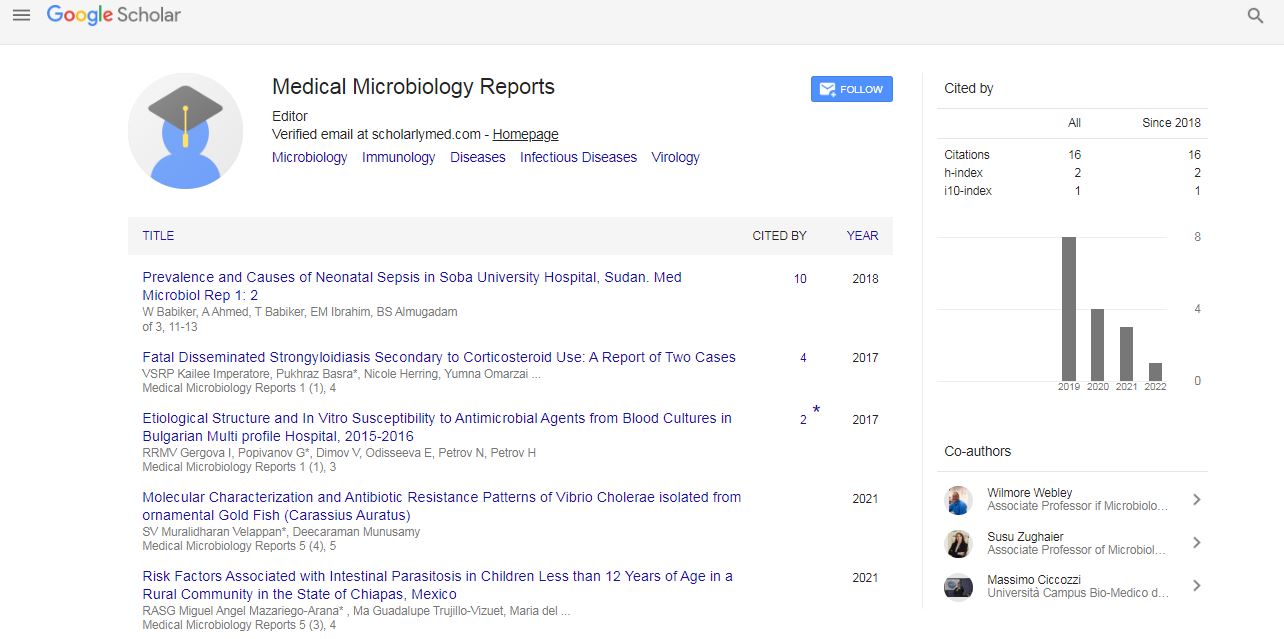Short Communication, Med Microbiol Rep Vol: 7 Issue: 3
Transmission of Zika Virus and its Impact on Public Health
Mariana Marques*
Department of Environment and Planning, University of Aveiro, Aveiro, Portugal
*Corresponding Author: Mariana Marques,
Department of Environment and
Planning, University of Aveiro, Aveiro, Portugal
E-mail: marquesmaria_na@edu.pt
Received date: 01 September, 2023, Manuscript No. MMR-23-117996;
Editor assigned date: 04 September, 2023, PreQC No. MMR-23-117996 (PQ);
Reviewed date: 18 September, 2023, QC No. MMR-23-117996;
Revised date: 25 September, 2023, Manuscript No. MMR-23-117996 (R);
Published date: 02 October, 2023 DOI: 10.4172/MMR.1000351
Citation: Marques M (2023) Transmission of Zika Virus and its Impact on Public Health. Med Microbiol Rep 7:3.
Description
Zika virus is a mosquito-borne virus that first attracted significant international attention in 2015 when it caused a large outbreak in the Americas, particularly in Brazil. This previously relatively obscure virus suddenly became a major public health concern due to its association with severe birth defects and neurological complications [1].
Transmission of Zika virus
The primary mode of transmission for Zika virus is through the bite of infected Aedes mosquitoes, particularly Aedes aegypti and Aedes albopictus. These mosquitoes are also responsible for transmitting other diseases, such as dengue and chikungunya, making Zika a part of a broader public health concern in regions where these vectors are prevalent. It's important to note that Zika can also be transmitted through sexual contact, from mother to child during pregnancy, and via blood transfusion [2-4].
Symptoms of Zika virus
Zika virus infection typically presents as a mild, self-limiting illness, with symptoms that can include fever, rash, joint pain, and conjunctivitis. These symptoms usually last for a few days to a week. Many people infected with Zika may not even realize they have the virus, as the symptoms are often mild or absent.
However, the most concerning aspect of Zika virus is its potential to cause serious complications, especially in certain populations. Pregnant women who contract Zika are at risk of giving birth to infants with a condition known as microcephaly, characterized by an abnormally small head and underdeveloped brain. The virus has also been linked to Guillain-Barré syndrome, a rare neurological disorder that can lead to muscle weakness and paralysis [5-7].
Impact on public health
The Zika virus outbreak that began in Brazil in 2015 had a profound impact on public health, both in the affected region and globally. This outbreak led to a surge in microcephaly cases among infants born to mothers who were infected with Zika during pregnancy. The images of babies born with severe birth defects shocked the world and heightened concerns about the virus [8].
In response to this public health crisis, numerous countries and international health organizations initiated efforts to control the spread of Zika. Public health campaigns were launched to educate the public about prevention strategies, and vector control programs were intensified to reduce the mosquito population [9].
Prevention of Zika virus
Preventing Zika virus transmission primarily involves controlling mosquito populations and reducing the risk of sexual transmission. Some key prevention measures include:
Mosquito control: Eliminating breeding sites for Aedes mosquitoes, such as standing water in containers, can help reduce mosquito populations. The use of insecticides and bed nets can also protect against mosquito bites.
Travel precautions: Travelers to areas with active Zika transmission should take precautions to avoid mosquito bites, such as wearing long-sleeved clothing and using insect repellent.
Global response
The international response to the Zika virus outbreak highlighted the need for coordinated efforts to combat emerging infectious diseases. Organizations like the World Health Organization (WHO) and the Centers for Disease Control and Prevention (CDC) played pivotal roles in raising awareness, providing guidance, and funding research on Zika [10].
Zika virus, once an obscure pathogen, became a global health concern due to its association with severe birth defects and neurological complications. While the virus itself often causes mild symptoms, its potential impact on pregnant women and their children raised significant alarm. The Zika outbreak of 2015 highlighted the importance of mosquito control, safe sexual practices, and international collaboration in addressing emerging infectious diseases.
References
- Faye O, Freire CC, Iamarino A, Faye O, de Oliveira JV, et al. (2014) Molecular evolution of Zika virus during its emergence in the 20th century. PLoS Negl Trop Dis 8(1):e2636.
- Duffy MR, Chen TH, Hancock WT, Powers AM, Kool JL, et al. (2009) Zika virus outbreak on Yap Island, federated states of Micronesia. N Engl J Med 360(24):2536-2543.
- Cao-Lormeau VM, Musso D (2014) Emerging arboviruses in the Pacific. Lancet 384(9954):1571-1572.
- Cao-Lormeau VM, Roche C, Teissier A, Robin E, Berry AL, et al (2014) Zika virus, French polynesia, south pacific, 2013. Emerg Infect Dis 20(6):1085.
- Faria NR, Quick J, Claro IM, Theze J, de Jesus JG, et al. (2017) Establishment and cryptic transmission of Zika virus in Brazil and the Americas. Nature 546(7658):406-410.
- Enfissi A, Codrington J, Roosblad J, Kazanji M, Rousset D (2016) Zika virus genome from the Americas. Lancet 387(10015):227-228.
- Brasil P, Pereira Jr JP, Moreira ME, Ribeiro Nogueira RM, Damasceno L, et al. (2016) Zika virus infection in pregnant women in Rio de Janeiro. N Engl J Med 375(24):2321-2334.
- Mlakar J, Korva M, Tul N, Popović M, Poljšak-Prijatelj M, et al. (2016) Zika virus associated with microcephaly. N Engl J Med 10;374(10):951-958.
- Hoen B, Schaub B, Funk AL, Ardillon V, Boullard M, et al. (2018) Pregnancy outcomes after ZIKV infection in French territories in the Americas. N Engl J Med 378(11):985-994.
- Yuan L, Huang XY, Liu ZY, Zhang F, Zhu XL, et al. (2017) A single mutation in the prM protein of Zika virus contributes to fetal microcephaly. Science 358(6365):933-936.
 Spanish
Spanish  Chinese
Chinese  Russian
Russian  German
German  French
French  Japanese
Japanese  Portuguese
Portuguese  Hindi
Hindi 
